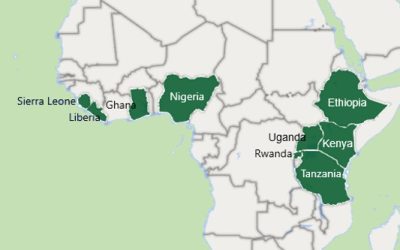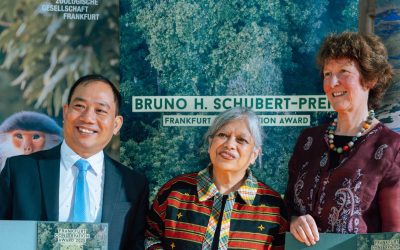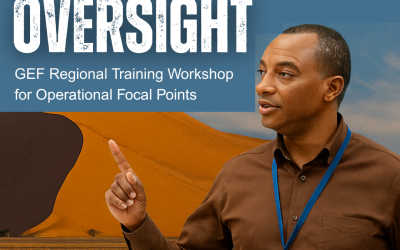24 conservation managers from across the Eastern Afromontane (EAM) Biodiversity Hotspot convened in Uganda for a CEPF experience-sharing event from 2nd to 5th July 2019. The event offered a platform for the managers to share their lessons and achievements based on real projects that the CEPF has funded in the hotspot, and also discuss ideas for sustaining conservation actions moving forward.
The event marked the end of CEPF investment in the hotspot. Since 2012, the CEPF has worked with over 90 civil society organizations to deliver over 150 priority projects in 15 countries. The CEPF also invested in the training of CSOs in the hotspot making them more effective in conserving biodiversity, and sustaining livelihoods. The Tropical Biology Association was a lead capacity development institution in the hotspot, and together with the hotspot’s Regional Implementation Team (CEPF-RIT), hosted the event.
Speaking at the event, Ann Nyambura (Programmes Manager for Tropical Biology Association) said, “The event was a great learning opportunity for both the managers and CEPF including the Regional Implementation Team (RIT). For the first time, grantees from different backgrounds had an opportunity to showcase their work, and learn from each other’s experience on how to improve their own projects and organizations. For CEPF/ RIT this was a unique opportunity to reconnect with CSOs they work with, and hear first-hand, what these CSOs consider their most important impacts, the challenges they face, and how they overcome them”
Summarizing the impacts of the project, the CEPF-RIT showcased key achievements of this CEPF investment in the region such as the creation of over 1 million hectares of newly protected land; improved management in over 4 million hectares of Key Biodiversity Areas; increased funding resulting in new projects; and increased livelihood benefits for communities.
Backing up these impacts are the lessons learned which were shared providing a wide breath of ideas for improving biodiversity conservation – and livelihoods – over the long term. Of these, project design, stakeholder involvement, community engagement and partnerships & collaborations emerged as the most pressing themes. Expounding these themes, the delegates highlighted the need to align projects –right from the design phase- to the existing cultures and traditions of local communities, and to relevant laws of the land-this is in addition to ensuring projects are well-grounded in science; identify the key roles and responsibilities of all stakeholders collaborators; engage communities throughout the project design and implementation process; and take more time to reconcile different approaches with partner organizations and design good benefit-sharing mechanisms and more importantly, incorporate proper collaboration measures with other organizations such as through securing effective agreement contracts as well as ensuring aligned conservation goals.
Gender mainstreaming emerged as a major lesson learned across all aspects of a project life-cycle which greatly influences resource use, knowledge needs and priorities. In further discussions, scientific evidence exhibited the increased yield in conservation outcomes as a result of gender involvement, and as such, the managers were urged to factor in gender throughout the project period.
Banking on these impacts, the delegates explored diverse options for sustainability at projects and organizational levels, necessary for long-term conservation of the hotspot. Under discussions on institutional stability, a concrete example was provided touching on financial longevity of organizations through creation of social enterprises. The delegates visited the Gorilla Conservation Coffee Café ran by Conservation through Public Health Uganda. The enterprise enables coffee farmers inhabiting Bwindi Forest protected area to have alternative livelihoods through access to markets thereby reducing their entry into the forest for food and firewood as well as their interaction with the gorillas. The visit presented a means for CSOs to maximize their revenues to avoid over-reliance on donors while also enhancing social development and conservation efforts. Emphasis was also placed on the need to link community livelihood needs with long-term conservation objectives for project sustainability.
In closing words, Olivier Langrad (CEPF Executive Director) encouraged the delegates to continue the good work noting that“In as much as key outcomes have been positive, the journey towards conserving the hotspot still continues despite the close of the project.It is therefore important that your project impacts capture emerging funding trends for diverse donor engagement and advance your efforts for partnerships and collaborations”.
The event served as an indicator of progress, giving the grantees a chance to draw upon the key findings and use them for future impacts.
“During the event, I learned that it is not easy to define, and learn, lessons. To critically look at your own work (both the good and the bad), to allow people to challenge you, and then to come up with something that is significant, authentic and replicable: it requires a lot of hard work. But I think all of us have come a long way, and have come out with new understanding, even if the understanding is that some things are really difficult. Now we have to make sure we actually learn our lessons, and apply them, so we become better at what we do: conserving this majestic Eastern Afromontane biodiversity hotspot- It is critical.” Maaike Manteen, CEPF EAM-RIT Manager







